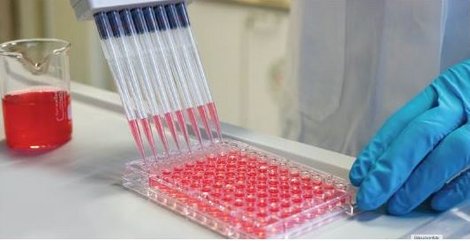Halle’s Immunic Research Pulls Out all the Stops for a COVID-19 Vaccine

Immune modulator IMU-838 – a next-generation active substance
The Weinberg Campus Technology Park in Halle is one of the Saxony-Anhalt Centers of Excellence. The campus has spawned global innovations, not least the latest from Biopharmaceuticals specialist Immunic Therapeutics, whose subsidiary Immunic Research GmbH is based there. It developed IMU-838, an active substance with anti-viral and anti-inflammatory properties. Laboratory tests now suggest that IMU-838 may be able to curb the spread of SARS-CoV-2.
“Let me tell you how it works – it’s so exciting,” says molecular biologist Hella Kohlhof. She paints a vivid picture of what happens to cells when coronavirus attacks them: “The virus feeds on DNA building blocks in its host cells. Those building blocks notice they’re dwindling and activate a specific enzyme to replenish themselves, which means the virus can go on feeding and spreading.”
The enzyme is called DHODH – at least that’s its abbreviated name, which is easier to pronounce than Dihydroorotate dehydrogenase. So logically, to starve the virus you need to block the DHODH. “Inhibiting DHODH prevents the production of essential DNA building blocks in cells infected with the virus and therefore also prevents the virus itself,” explains Dr. Kohlhof. She goes on to say that the principle works in other metabolically altered cells, for example in cancers, inflammatory diseases and autoimmune diseases.
Hella Kohlhof is Managing Director of Immunic Research GmbH in Saxony-Anhalt. The company is a subsidiary of Immunic Therapeutics, a biopharmaceuticals multinational headquartered in New York, with sister companies in Munich, Melbourne Australia, and Halle. The decision to set up a facility in Halle came out of a good relationship with the Fraunhofer Institute for Cell Therapy and Immunology (IZI) in Leipzig, whose Department of Drug Design and Target Validation is also based there.
IMU-838 – a next-generation active substance
Immunic Research GmbH on Halle’s Weinberg Campus Technology Park manufactures active substances for preclinical trials and tests some of them on site. “Since we set up here in 2017, we’ve been working closely with the IZI both in terms of knowledge transfer and by using their laboratories,” explains Kohlhof. Now the subsidiary’s MD, she was a founding member of parent company Immunic Therapeutics in 2016 and is still its Chief Scientific Officer, with extensive experience in drug development.
Hella Kohlhof lists diseases for which more effective treatments are constantly being sought – like multiple sclerosis, chronic inflammatory bowel conditions such as Crohn’s and ulcerative colitis, and psoriasis. Immunic’s active substance IMU-838 holds great promise. In clinical trials, 650 people were already treated with the drug, including healthy subjects as well as patients with multiple sclerosis, ulcerative colitis, rheumatoid arthritis and primary sclerosing cholangitis. The trials suggest that IMU-838 is safe and well-tolerated. The company has dubbed its immune modulator a “next-generation” active substance.
“It can block DHODH – but there’s more,” says Kohlhof, who gives a simplified explanation: IMU-838 acts on activated T and B cells while leaving other immune cells largely unaffected so that they can fight infections for example. But why do we need to inhibit the metabolism of activated immune cells in such a targeted way? Kohlhof explains that it’s because the immune system often overreacts, in which case immune cells can also cause damage. The respiratory failure seen in serious coronavirus cases is not due to the virus alone, but also to the destructive power of an immune system on the rampage.
A blockade against SARS-CoV-2
In in-vitro trials, IMU-838 showed proven anti-viral effects against HIV, Hepatitis C and Influenza A. In February 2020, when it became clear that Covid-19 was turning into a pandemic, Immunic’s team decided to test IMU-838 on the novel virus. They ran laboratory tests using cultured cell models infected with isolated coronavirus. Preclinical trials since then have shown that IMU-838 stops SARS-CoV-2 from replicating.
“We’re just preparing for Phase 2 clinical trials to establish whether IMU-838 could be administered orally for Covid-19,” says Kohlhof, adding that there would be no danger of drug resistance with this treatment option since it targets the host cells rather than the virus.
If the clinical trials are approved, they will be rolled out in Germany, Europe and the U.S. Immunic Research’s MD anticipates a swift decision from the regulatory authorities.
Author: Kathrain Graubaum
HERE medicine has the right technology.

Innovative prostheses, surgical robots, telemedicine - the possibilities of medical technology revolutionize diagnosis and therapy. Companies from Saxony-Anhalt are at the forefront of the development and manufacture of innovative medical technology products. > further information about the MedTech industry in Saxony-Anhalt
